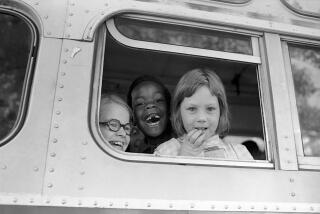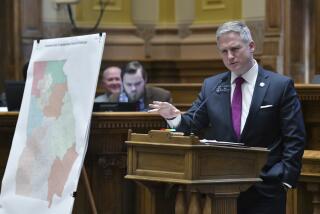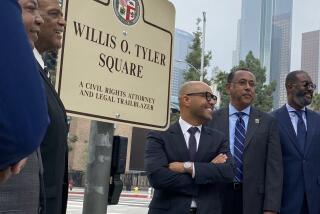William Augustus Bootle, 102; Issued String of Historic Civil Rights Rulings in the 1960s
- Share via
Retired U.S. District Judge William Augustus Bootle, who issued a string of historic civil rights rulings in the 1960s, including the order allowing blacks to enter the University of Georgia, died Tuesday at his home in Macon, Ga. He was 102.
Dee Mitchell, administrative assistant at Snow’s Memorial Chapel, confirmed Bootle’s death.
Among Bootle’s rulings were ones integrating buses and school systems and ensuring blacks’ place on voter rolls. Macon’s federal courthouse was named for him in 1998.
Bootle “took the lead in bringing about the elimination of segregation in the field of education and otherwise,” Carl Sanders, Georgia’s governor from 1963 to 1967, said Tuesday.
“At the time, most politicians didn’t appreciate his attitude and his decisions,” said Sanders, 79.
“But in the long run, when you look back on the result of what he was trying to do, you can’t help but admit and admire the courage and the legal fortitude that he expressed at that particular time in the history of our state and the country.”
Bootle signed the University of Georgia order in 1961 after a weeklong trial that pitted black students Charlayne Hunter and Hamilton Holmes Jr. against the school’s top officials.
“Someone asked me the other day, ‘Wasn’t it hard to make the decision to let blacks in?’ ” Bootle said at the time he turned 100. “I said it wasn’t hard at all. Once you decide what’s right, the making of it is easy. Right is right.”
In response, people in Macon burned the judge in effigy, and Georgia’s governor threatened to cut the university’s budget.
But the threats never deterred Bootle. He ordered several middle Georgia counties to restore the names of blacks who were removed from voter rolls. He also directed Bibb Transit Co. to integrate seating on its buses.
But his most bitter battle would be the campaign to desegregate Bibb County schools, which took seven years. The struggle began in 1963, when a suit was filed in U.S. District Court on behalf of 44 black children.
The next year, Bootle ordered the school board to make a “prompt and reasonable start” toward eliminating separate school systems. But it would be 1970 before the schools were finally desegregated.
President Eisenhower nominated Bootle to the federal bench in 1954, the same year the U.S. Supreme Court decided the landmark desegregation case Brown vs. the Board of Education of Topeka, Kan. He retired as senior judge in 1970 but continued presiding over federal cases part time until 1981.
Bootle was born in 1902 in Walterboro, S.C., but spent most of his life in Georgia.
His family moved to Reidsville in 1917, and he came to Macon and enrolled in Mercer University in 1920. He earned his bachelor’s degree and his law degree at Mercer.
His funeral is scheduled for Saturday.
More to Read
Sign up for Essential California
The most important California stories and recommendations in your inbox every morning.
You may occasionally receive promotional content from the Los Angeles Times.













